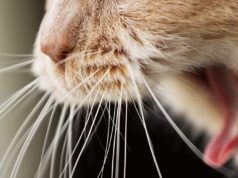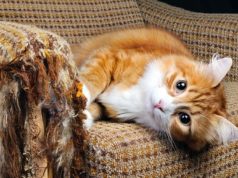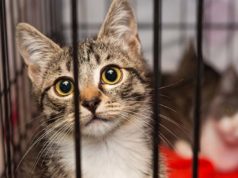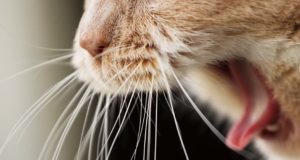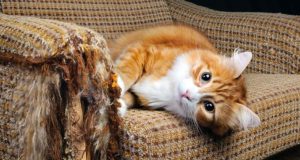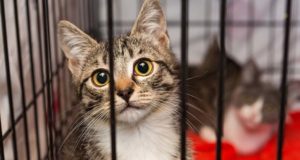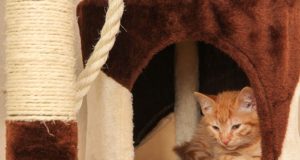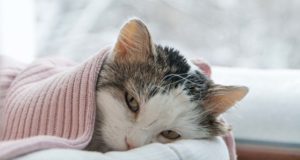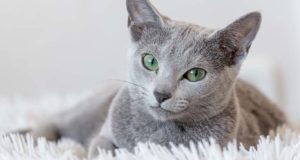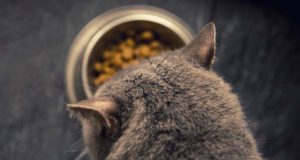Since domesticating cats, we have extended their lifespan from 4-5 years in the wild, to 12-20 years living in our homes. It seems then, that a longer life expectancy is factor from the security of living with people. There is no doubt that a cat’s lifespan has increased, since becoming our companions.
Though they can still suffer from many life threatening illnesses, and hereditary diseases. So it does not necessarily mean that your cat will live to a ripe old age. But, we can do plenty to help prolong their lives.
Here are some of the tips that may potentially extend your cat’s lifespan.
ALSO READ: 20 Things You Didn’t Know About Catnip [Infographic]
9 Ways to Increase Cat’s Lifespan
1. Traffic Accidents
One of the major causes of death in younger cats is trauma. Many free-roaming cats will be prone to traffic accidents. The National Traffic Safety Administration estimates that 5.4 million cats are in traffic accidents in the USA alone. Of which, 97% will be fatal.
An indoor-only cat will not succumb to the many injuries that a cat allowed outdoors can sustain.
2. Feline Diseases
Feline diseases are part of another of those indoor vs outdoor statistics. The Humane Society of America states that there are 22,000 cat deaths daily just from these disease alone.
An outdoor cat is more likely to pick it up, as it spreads from an infected cat’s body fluids. This can include such things as saliva during grooming, mating, or even a bite or scratch whilst fighting. You can reduce this risk by ensuring your cat has the non-core vaccination, for feline leukemia.
If your cat is always updated with the core vaccinations, you are helping to protect your feline friend against terrible diseases. These can include can include feline distemper and rabies, FIV as well as other common simpler diseases a cat is susceptible to. The non-core vaccinations are for cats allowed to roam outdoors. They must be protected against feline leukemia. All vaccinations will need updating, so keep going for those boosters when advised to do so. Vaccinations are one of the reasons cats’ longevity is so good.
3. Well Balanced Diet
 A domesticated cat has the luxury of knowing where its next meal is coming from. This alone is not sufficient if that meal is unhealthy. You need to ensure you feed your cat a good diet. Domesticated cats are more prone to obesity, especially indoor felines. As in people, being overweight can lead to many other health problems, such as diabetes. A well balanced diet is a must.
A domesticated cat has the luxury of knowing where its next meal is coming from. This alone is not sufficient if that meal is unhealthy. You need to ensure you feed your cat a good diet. Domesticated cats are more prone to obesity, especially indoor felines. As in people, being overweight can lead to many other health problems, such as diabetes. A well balanced diet is a must.
Picking between dry and wet cat food is an important decision. Familiarize yourself with the differences between the two. Should you choose a dry diet, it is vital that water is always available to avoid your cat suffering from dehydration. Similarly, different age stages and diseases should be addressed with proper diet. For example, kittens should be fed specific kitten food brands, senior cats should get senior cat food, cats with health problems or things like sensitive stomach must have their diets adjusted too.
Do not give too many treats as they are high in calories. A cat needs very few carbs, as it is a obligate carnivore, which means its main source of nutrition is from meat. Cats will eat vegetables, and other food stuffs, but their core need is a meat diet. If this is not given, you may shorten your cat’s lifespan.
4. Constant Water Supply
It may seem obvious that a cat is going to need water at some point in the day. Dehydration can bring about kidney problems. Ensure your cat has access to water at all times. Some cats will drink from a running tap, or even share a bowl of water with other pets, such as dogs. Ensure there is a bowl of clean water always available, most particularly if your cat eats a lot of dried foods.
5. Hairballs
These disgusting and smelly balls of yuk are an inevitability with a cat. The more they groom, the more they are to coughing up hairballs. If your cat suffers from them often, then some suggest a pet laxative to ease the problem. That’s a matter of personal choice.
As with people, there is no harm to this, if only given occasionally. Too often and the digestive system can come to rely on them. The best treatment to combat this problem is with regular human grooming. If you have your cat from a kitten, this should become a part of their daily lives. Indeed, most cats love pampering.
6. Indoors vs Outdoors
Many house cats live long lives, even though they roam outdoors. Without a doubt, it could reduce their chances. As in the statistics for traffic accidents, and the cat leukemia virus. Farm cats can be domesticated, or feral. City cats are more at risk with traffic accidents, and territorial fighting incidents.
Some people believe a cat should not be allowed to roam. Not only are they predators, but they can be a nuisance to other people. Indoors will give them a better chance of a long life. Though others may argue that it is not nature’s way to keep animals locked up. There are no laws or legal guidance to cover this, it’s really a personal choice. If you own a pedigree cat, then you will want to protect your investment against possible theft.
7. Spaying and Neutering
It is better to get your cat neutered, whether it’s an indoor or outdoor cat. Being spayed leads to better behaviour, as it will not produce the hormones for mating. Nothing makes a male cats more aggressive than a female on heat.
Neutered cats are not as territorial, so when outdoors they will be less inclined to fight. The Banfield Applied Research and Knowledge report that a neutered male will live 62% longer than an un-neutered male cat. A female, 39% longer than an un-spayed female cat.
8. Regular Vet Checkups
This is not only for vaccination boosters, but let the experts check your cat’s other things, such as cat’s teeth and bones, ensuring your cat is in tip top condition, without any underlying conditions. Once a year should be adequate. It does add to the cost of owning a cat, but it serves to increase their longevity. This way, any health problems will be caught early.
9. Entertain the Cat
 This is more so for an indoor cat, cat toys must be a necessity. As most cat owners will learn, cats are curious creatures. Give them a box, and they are like children, finding it a most amusing toy. Keep your cat’s mind occupied, and it will not become bored. There are associated problems that come with a bored cat, such as overeating, or being aggressive with other pets, or even people. Things like catnip may stimulate your cat, and providing them with a cat tree is a good idea too.
This is more so for an indoor cat, cat toys must be a necessity. As most cat owners will learn, cats are curious creatures. Give them a box, and they are like children, finding it a most amusing toy. Keep your cat’s mind occupied, and it will not become bored. There are associated problems that come with a bored cat, such as overeating, or being aggressive with other pets, or even people. Things like catnip may stimulate your cat, and providing them with a cat tree is a good idea too.
Lots of different cat toys not only helps alleviate boredom, but can provide a means of exercise. A cat needs a good balance of exercise and entertainment, even as it ages. Sure, cat’s love to sleep, dozing off anywhere between 16-20 hours a day. This makes it more important to exercise their minds and their bodies while they are awake. Plus, they still have that feral instinct to hunt, so use that as a means to create play, and therefore exercise.
Of course, how long your cat lives also depends on the breed, and if outdoors, the geographical area you live in. All you can do as a responsible owner, is to ensure the basics are taken care of. Give your cat as long a life as is possible.
READ NEXT: 12 Tips to Choosing the Best Cat Food for Your Feline



